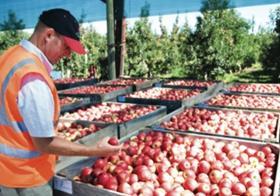
Growers in the area around Nelson in New Zealand are reportedly pulling up apple trees in order to limit losses incurred during what has been described by some as one of the most challenging export seasons for many years.
Last year, apple exports earned the region NZ$130m (€64.5m), but industry body Pipfruit NZ estimates that figure could fall by NZ$50m (€24.8m) this year.
According to reports in the Nelson Mail, growers of Braeburn and Royal Gala have been particularly badly affected, with some revealing a significant downturn in the volume of apples sold to European markets this season.
The situation has prompted some to call for greater consolidation among exporters. 'There's got to be further moves for consolidation if this area if to prosper,' said Nick Patterson, managing director of Wai-West Agriculture.
He added: 'We need to start thinking about NZ Inc in this process. There is no room for individual exporters to be championing their cause, saying 'I'm big enough and brave enough and the rest can get out of my way'. I don't think that's the stance.'
Pipfruit New Zealand chairman Ian Palmer has already called on the country's exporters to develop a more disciplined and collective marketing structure for its shipments and sales to Europe.
Speaking to Eurofruit Magazine in August, he explained that the current European export model left no room for coordinated branding or promotion, putting New Zealand at risk of being dragged by the market into a spiral of declining prices, something that he said could be seen in the current apple season.
“We have 44 exporters supplying fruit to Europe without any coordination into a relatively small market with a short sales window and this is just not sensible,” he stated. “We have not necessarily developed relationships with the customer or the consumer.'
The development of new premium varieties like Jazz and Envy are expected to help the industry safeguard future sales and, in particular, reduce its dependency on older markets like Europe and the US by generating greater interest among Asian customers.
Turners & Growers chairman Tony Gibbs told the Nelson Mail: 'As at last Friday (25 September), Jazz was 98 per cent sold and its overall volume 96 per cent sold.'
He also revealed that Jazz was selling at a 25 per cent premium in Europe, and a 45 per cent premium in the US, compared with Braeburn.
'We are forecasting overall worldwide Jazz returns to growers will command a premium of around 40 per cent more than Braeburn,' he added.



